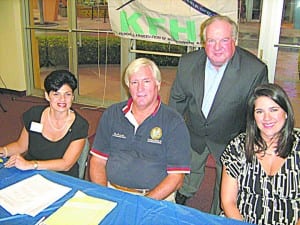
The continuing threat of higher costs and increasing cancellations of Florida homeowner insurance led most Kendall Federation of Homeowner Associations members in attendance to voice support for a federal catastrophic policy during a Sept. 12 panel discussion.
A wide-ranging discussion covered topics from pending increases in “Sinkhole” rates unfairly affecting Miami-Dade to restructuring Citizens Property Insurance Corporation, the legislature-mandated state agency writing coverage for homeowners canceled by private insurers.
“Please take back to Tallahassee how very serious this problem is, summarized Lee Zimmerman, KFHA president, in concluding a 90-minute session spotlighting legislators Rep. Ron Saunders (D-120), House minority leader, and Sen. Anitere Flores, (R-38) now serving her first Senate term after six years in the House.
They were joined by Dulce M. Suarez-Resnick, vice president personal lines for NCF Insurance Associates, and panel moderator Al Sunshine, WFOR/CBS Channel 4 consumer reporter and Community Newspapers columnist.
Senate Bill 408, listing 14 changes in insurance statutes, includes reduction of windstorm and hurricane claims brought within three years (instead of five) and sinkhole loss within two years, leading to potential increases for Miami-Dade where sinkholes are a rarity, or “non-existent in the Keys, my own territory,” said Rep. Saunders.
Florida Insurance Council predicts “CPIC and private insurers are expected to pay out up to $2.5 billion during the five years ending in 2010…the vast majority for claims involving minor cracks and not true sinkhole damage.”
Increasing casualties, primarily in Pasco and Hernando counties in Central Florida, will impact homeowners statewide with higher rates that include South Florida, causing policy jumps of $12-$15 in South Florida but up to $100 in common sinkhole areas, explained Sen. Flores.
“Dig out a hole to plant a tree in my yard and I’ll hit coral rock about a foot down,” interjected Sunshine on Miami-Dade’s potential for collapsed earth sinkholes.
To reduce policy cost, KFHA’s Libby Perez asked, “Why can’t legislative action be taken to have CPI write only the mortgaged amount for a homeowner instead of a home’s replacement value?”
Current state statutes require agencies determine replacement value to include all structural and interior elements, which, for example, could account for $300,000 value on a home with a $100,000 mortgaged amount, Suarez-Resnick said.
“Insurance agencies use a software program that will figure values that can run from a 69-cent shingle to a $5 per barrel tile for a roof,” she explained.
More to the point, she later added, is the effort since 2003 by agencies to expand the national FEMA flood act to include catastrophic events of all kinds, “something that the interior U.S. states have vigorously opposed perhaps until recent years when tornadoes have devastated so many of those central areas,” Suarez-Resnick added.
“South Florida’s major problem? It’s the biggest area in the U.S. for filing fake claims,” Rep. Saunders answered. “But lowering rates nationwide boils down to coastal versus interior areas. This is where private companies raise rates or refuse to cover, all leading to higher premiums and lack of competition to reduce them.”
Advice from Rep. Saunders and Sen. Flores to level premium costs for storm-related casualty: Get the Miami-Dade delegation in Washington to work for a national coverage plan applicable to all major catastrophes such as tornadoes, hurricanes, flooding and other major weather events like those of recent years that afflict interior and coastal regions of the U.S.






